Business Law Report: Unfair Dismissal, Directors' Duties Analysis
VerifiedAdded on 2022/08/03
|7
|1444
|20
Report
AI Summary
This business law report examines two key areas: unfair dismissal and directors' duties under the Companies Act 2006. The report defines unfair dismissal, referencing the Employment Rights Act 1996 and relevant case law, such as Devis & Sons Ltd v Atkins and ADT Auctions Ltd v. Nayar, and outlines the remedies available to employees, including compensation and reinstatement, while emphasizing the importance of minimizing losses. The second part of the report details the duties of company directors as outlined in the Companies Act 2006, including acting within the company's constitution, promoting company success, exercising independent judgment, avoiding conflicts of interest, and maintaining ethical conduct. It also discusses the role of a Compliance Management System (CMS) in ensuring adherence to regulations and ethical standards. The report concludes by highlighting the importance of directors following these guidelines to avoid penalties and maintain a proper regulatory structure.

Running head- BUSINESS LAW
Business Law
Name of the Student
Name of the University
Author Note
1.
Business Law
Name of the Student
Name of the University
Author Note
1.
Paraphrase This Document
Need a fresh take? Get an instant paraphrase of this document with our AI Paraphraser
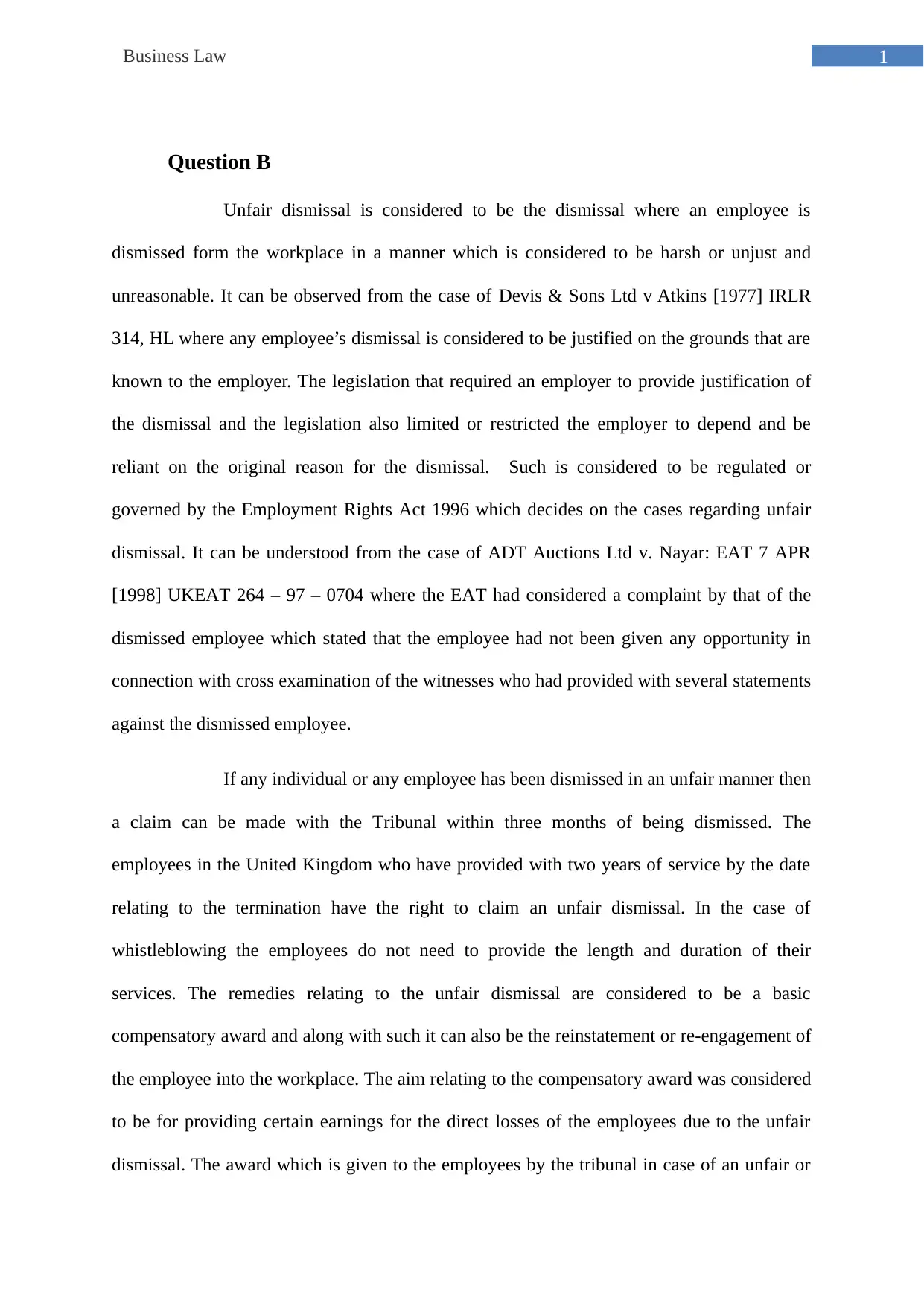
1Business Law
Question B
Unfair dismissal is considered to be the dismissal where an employee is
dismissed form the workplace in a manner which is considered to be harsh or unjust and
unreasonable. It can be observed from the case of Devis & Sons Ltd v Atkins [1977] IRLR
314, HL where any employee’s dismissal is considered to be justified on the grounds that are
known to the employer. The legislation that required an employer to provide justification of
the dismissal and the legislation also limited or restricted the employer to depend and be
reliant on the original reason for the dismissal. Such is considered to be regulated or
governed by the Employment Rights Act 1996 which decides on the cases regarding unfair
dismissal. It can be understood from the case of ADT Auctions Ltd v. Nayar: EAT 7 APR
[1998] UKEAT 264 – 97 – 0704 where the EAT had considered a complaint by that of the
dismissed employee which stated that the employee had not been given any opportunity in
connection with cross examination of the witnesses who had provided with several statements
against the dismissed employee.
If any individual or any employee has been dismissed in an unfair manner then
a claim can be made with the Tribunal within three months of being dismissed. The
employees in the United Kingdom who have provided with two years of service by the date
relating to the termination have the right to claim an unfair dismissal. In the case of
whistleblowing the employees do not need to provide the length and duration of their
services. The remedies relating to the unfair dismissal are considered to be a basic
compensatory award and along with such it can also be the reinstatement or re-engagement of
the employee into the workplace. The aim relating to the compensatory award was considered
to be for providing certain earnings for the direct losses of the employees due to the unfair
dismissal. The award which is given to the employees by the tribunal in case of an unfair or
Question B
Unfair dismissal is considered to be the dismissal where an employee is
dismissed form the workplace in a manner which is considered to be harsh or unjust and
unreasonable. It can be observed from the case of Devis & Sons Ltd v Atkins [1977] IRLR
314, HL where any employee’s dismissal is considered to be justified on the grounds that are
known to the employer. The legislation that required an employer to provide justification of
the dismissal and the legislation also limited or restricted the employer to depend and be
reliant on the original reason for the dismissal. Such is considered to be regulated or
governed by the Employment Rights Act 1996 which decides on the cases regarding unfair
dismissal. It can be understood from the case of ADT Auctions Ltd v. Nayar: EAT 7 APR
[1998] UKEAT 264 – 97 – 0704 where the EAT had considered a complaint by that of the
dismissed employee which stated that the employee had not been given any opportunity in
connection with cross examination of the witnesses who had provided with several statements
against the dismissed employee.
If any individual or any employee has been dismissed in an unfair manner then
a claim can be made with the Tribunal within three months of being dismissed. The
employees in the United Kingdom who have provided with two years of service by the date
relating to the termination have the right to claim an unfair dismissal. In the case of
whistleblowing the employees do not need to provide the length and duration of their
services. The remedies relating to the unfair dismissal are considered to be a basic
compensatory award and along with such it can also be the reinstatement or re-engagement of
the employee into the workplace. The aim relating to the compensatory award was considered
to be for providing certain earnings for the direct losses of the employees due to the unfair
dismissal. The award which is given to the employees by the tribunal in case of an unfair or
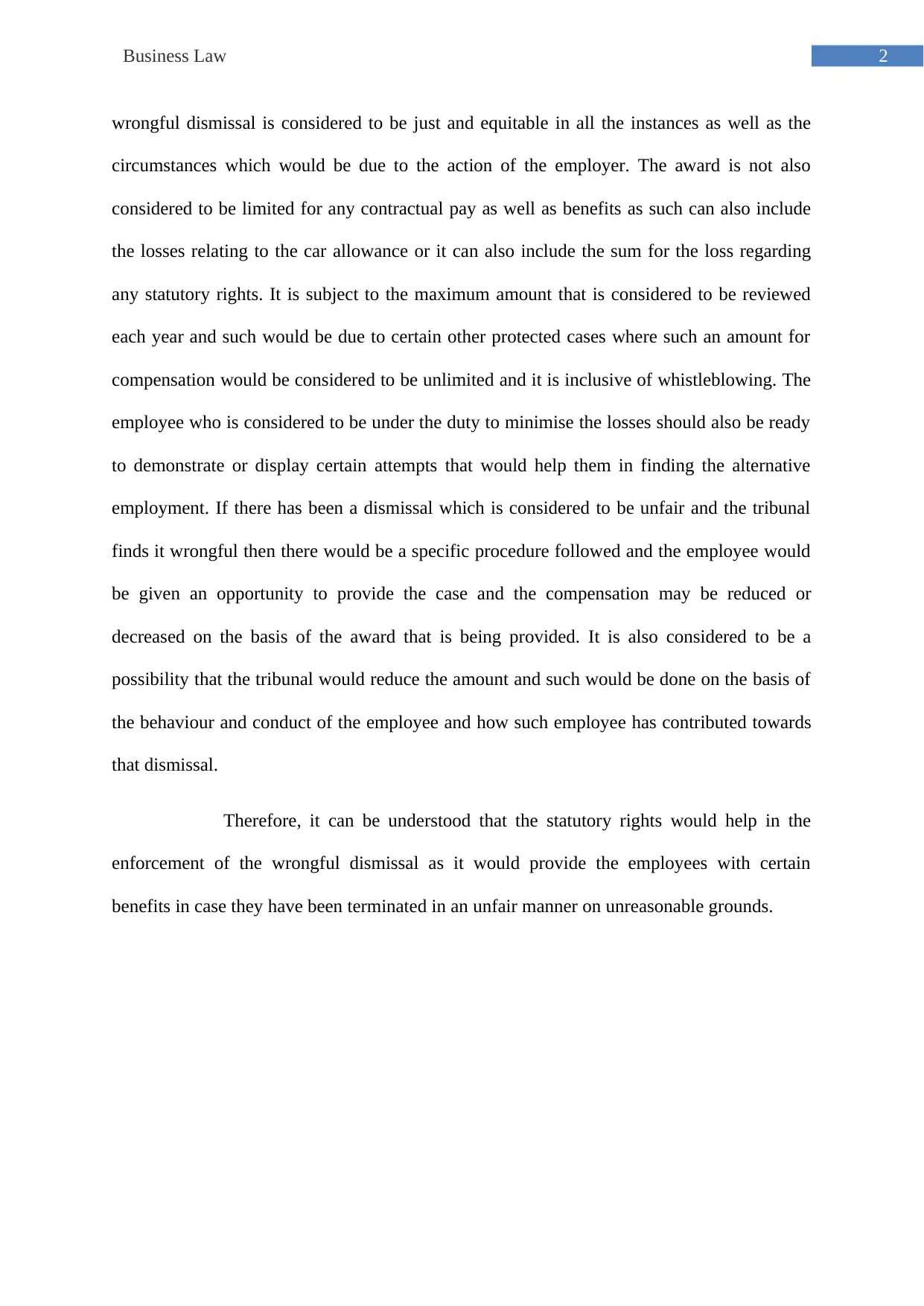
2Business Law
wrongful dismissal is considered to be just and equitable in all the instances as well as the
circumstances which would be due to the action of the employer. The award is not also
considered to be limited for any contractual pay as well as benefits as such can also include
the losses relating to the car allowance or it can also include the sum for the loss regarding
any statutory rights. It is subject to the maximum amount that is considered to be reviewed
each year and such would be due to certain other protected cases where such an amount for
compensation would be considered to be unlimited and it is inclusive of whistleblowing. The
employee who is considered to be under the duty to minimise the losses should also be ready
to demonstrate or display certain attempts that would help them in finding the alternative
employment. If there has been a dismissal which is considered to be unfair and the tribunal
finds it wrongful then there would be a specific procedure followed and the employee would
be given an opportunity to provide the case and the compensation may be reduced or
decreased on the basis of the award that is being provided. It is also considered to be a
possibility that the tribunal would reduce the amount and such would be done on the basis of
the behaviour and conduct of the employee and how such employee has contributed towards
that dismissal.
Therefore, it can be understood that the statutory rights would help in the
enforcement of the wrongful dismissal as it would provide the employees with certain
benefits in case they have been terminated in an unfair manner on unreasonable grounds.
wrongful dismissal is considered to be just and equitable in all the instances as well as the
circumstances which would be due to the action of the employer. The award is not also
considered to be limited for any contractual pay as well as benefits as such can also include
the losses relating to the car allowance or it can also include the sum for the loss regarding
any statutory rights. It is subject to the maximum amount that is considered to be reviewed
each year and such would be due to certain other protected cases where such an amount for
compensation would be considered to be unlimited and it is inclusive of whistleblowing. The
employee who is considered to be under the duty to minimise the losses should also be ready
to demonstrate or display certain attempts that would help them in finding the alternative
employment. If there has been a dismissal which is considered to be unfair and the tribunal
finds it wrongful then there would be a specific procedure followed and the employee would
be given an opportunity to provide the case and the compensation may be reduced or
decreased on the basis of the award that is being provided. It is also considered to be a
possibility that the tribunal would reduce the amount and such would be done on the basis of
the behaviour and conduct of the employee and how such employee has contributed towards
that dismissal.
Therefore, it can be understood that the statutory rights would help in the
enforcement of the wrongful dismissal as it would provide the employees with certain
benefits in case they have been terminated in an unfair manner on unreasonable grounds.
⊘ This is a preview!⊘
Do you want full access?
Subscribe today to unlock all pages.

Trusted by 1+ million students worldwide
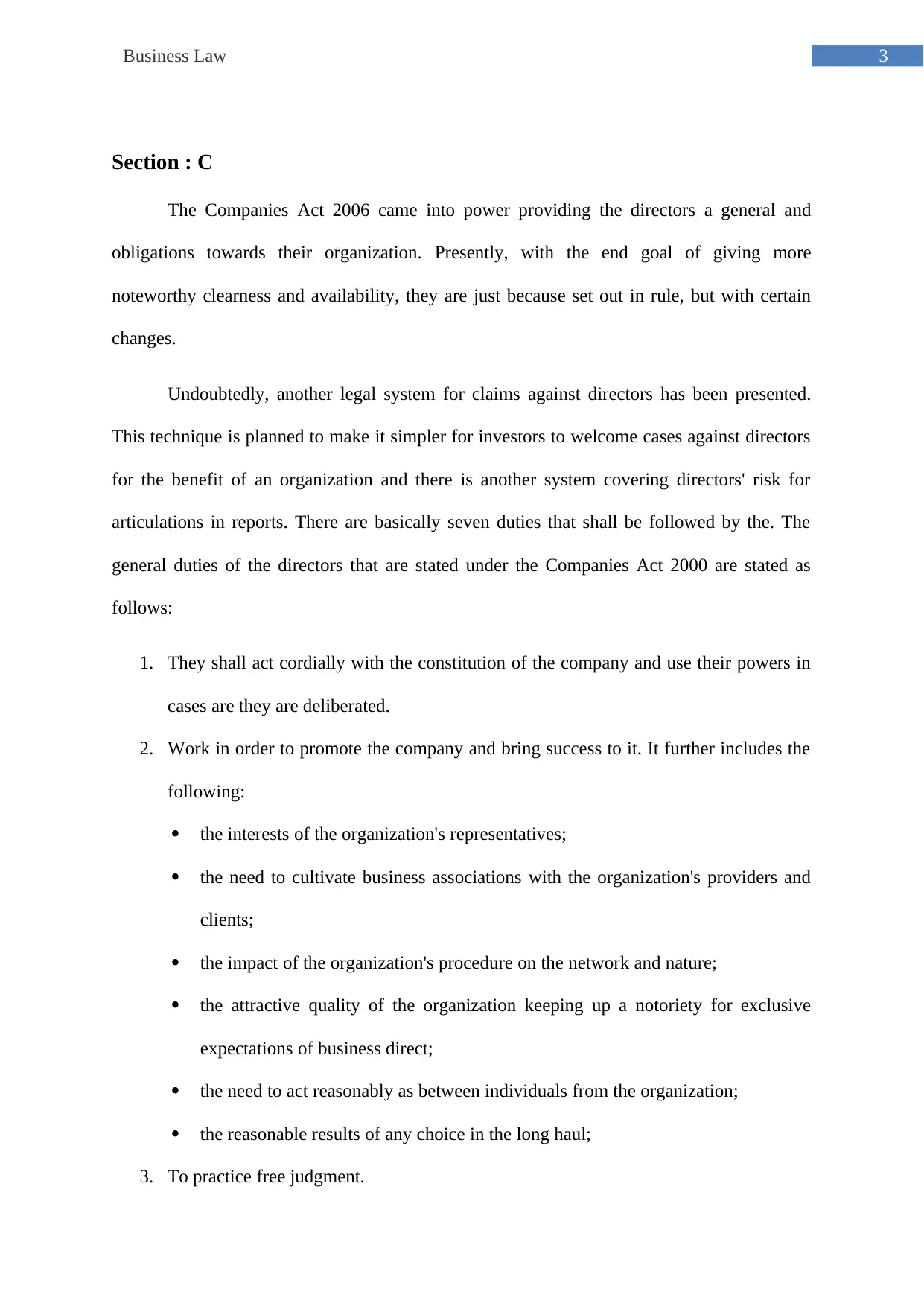
3Business Law
Section : C
The Companies Act 2006 came into power providing the directors a general and
obligations towards their organization. Presently, with the end goal of giving more
noteworthy clearness and availability, they are just because set out in rule, but with certain
changes.
Undoubtedly, another legal system for claims against directors has been presented.
This technique is planned to make it simpler for investors to welcome cases against directors
for the benefit of an organization and there is another system covering directors' risk for
articulations in reports. There are basically seven duties that shall be followed by the. The
general duties of the directors that are stated under the Companies Act 2000 are stated as
follows:
1. They shall act cordially with the constitution of the company and use their powers in
cases are they are deliberated.
2. Work in order to promote the company and bring success to it. It further includes the
following:
the interests of the organization's representatives;
the need to cultivate business associations with the organization's providers and
clients;
the impact of the organization's procedure on the network and nature;
the attractive quality of the organization keeping up a notoriety for exclusive
expectations of business direct;
the need to act reasonably as between individuals from the organization;
the reasonable results of any choice in the long haul;
3. To practice free judgment.
Section : C
The Companies Act 2006 came into power providing the directors a general and
obligations towards their organization. Presently, with the end goal of giving more
noteworthy clearness and availability, they are just because set out in rule, but with certain
changes.
Undoubtedly, another legal system for claims against directors has been presented.
This technique is planned to make it simpler for investors to welcome cases against directors
for the benefit of an organization and there is another system covering directors' risk for
articulations in reports. There are basically seven duties that shall be followed by the. The
general duties of the directors that are stated under the Companies Act 2000 are stated as
follows:
1. They shall act cordially with the constitution of the company and use their powers in
cases are they are deliberated.
2. Work in order to promote the company and bring success to it. It further includes the
following:
the interests of the organization's representatives;
the need to cultivate business associations with the organization's providers and
clients;
the impact of the organization's procedure on the network and nature;
the attractive quality of the organization keeping up a notoriety for exclusive
expectations of business direct;
the need to act reasonably as between individuals from the organization;
the reasonable results of any choice in the long haul;
3. To practice free judgment.
Paraphrase This Document
Need a fresh take? Get an instant paraphrase of this document with our AI Paraphraser
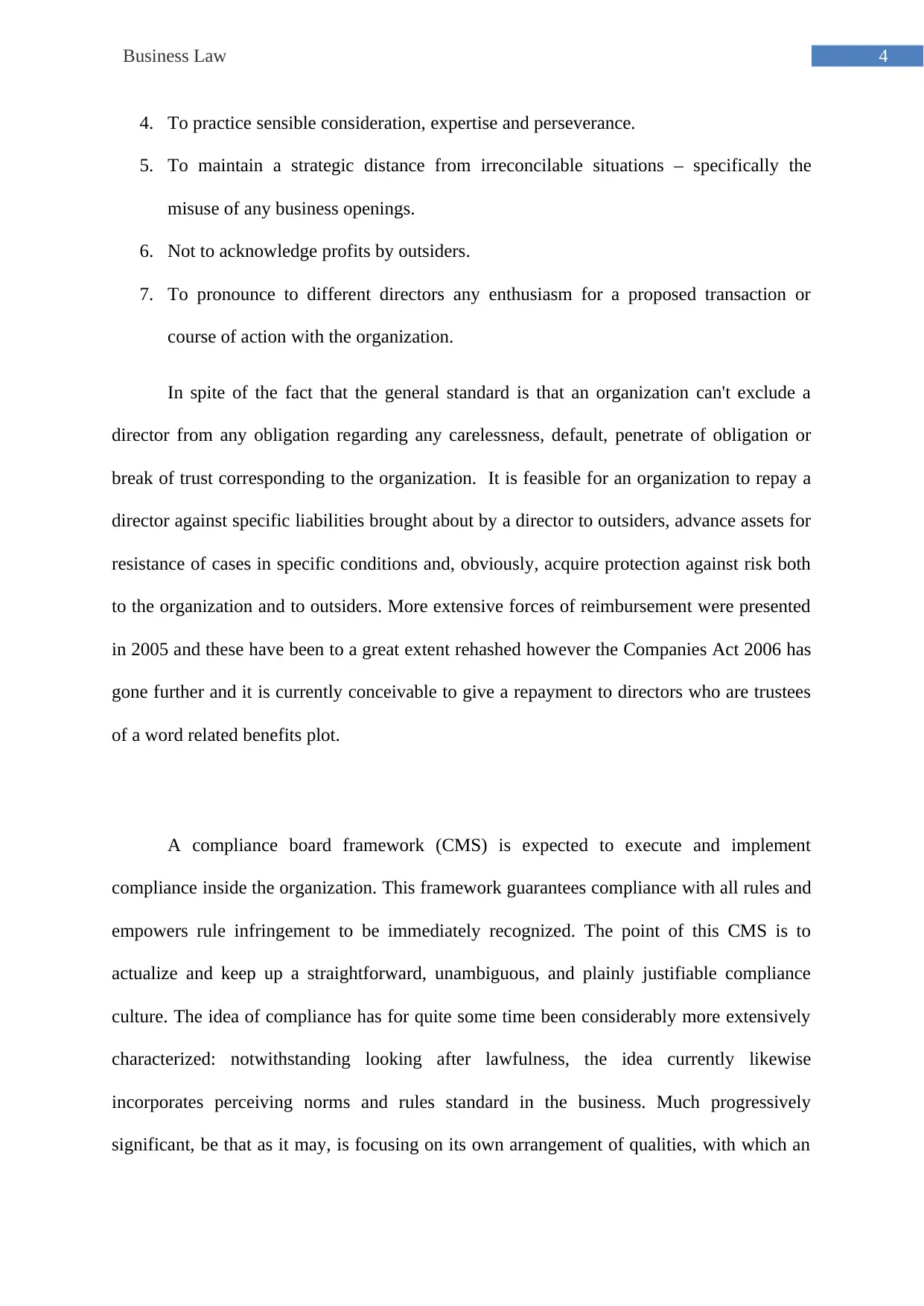
4Business Law
4. To practice sensible consideration, expertise and perseverance.
5. To maintain a strategic distance from irreconcilable situations – specifically the
misuse of any business openings.
6. Not to acknowledge profits by outsiders.
7. To pronounce to different directors any enthusiasm for a proposed transaction or
course of action with the organization.
In spite of the fact that the general standard is that an organization can't exclude a
director from any obligation regarding any carelessness, default, penetrate of obligation or
break of trust corresponding to the organization. It is feasible for an organization to repay a
director against specific liabilities brought about by a director to outsiders, advance assets for
resistance of cases in specific conditions and, obviously, acquire protection against risk both
to the organization and to outsiders. More extensive forces of reimbursement were presented
in 2005 and these have been to a great extent rehashed however the Companies Act 2006 has
gone further and it is currently conceivable to give a repayment to directors who are trustees
of a word related benefits plot.
A compliance board framework (CMS) is expected to execute and implement
compliance inside the organization. This framework guarantees compliance with all rules and
empowers rule infringement to be immediately recognized. The point of this CMS is to
actualize and keep up a straightforward, unambiguous, and plainly justifiable compliance
culture. The idea of compliance has for quite some time been considerably more extensively
characterized: notwithstanding looking after lawfulness, the idea currently likewise
incorporates perceiving norms and rules standard in the business. Much progressively
significant, be that as it may, is focusing on its own arrangement of qualities, with which an
4. To practice sensible consideration, expertise and perseverance.
5. To maintain a strategic distance from irreconcilable situations – specifically the
misuse of any business openings.
6. Not to acknowledge profits by outsiders.
7. To pronounce to different directors any enthusiasm for a proposed transaction or
course of action with the organization.
In spite of the fact that the general standard is that an organization can't exclude a
director from any obligation regarding any carelessness, default, penetrate of obligation or
break of trust corresponding to the organization. It is feasible for an organization to repay a
director against specific liabilities brought about by a director to outsiders, advance assets for
resistance of cases in specific conditions and, obviously, acquire protection against risk both
to the organization and to outsiders. More extensive forces of reimbursement were presented
in 2005 and these have been to a great extent rehashed however the Companies Act 2006 has
gone further and it is currently conceivable to give a repayment to directors who are trustees
of a word related benefits plot.
A compliance board framework (CMS) is expected to execute and implement
compliance inside the organization. This framework guarantees compliance with all rules and
empowers rule infringement to be immediately recognized. The point of this CMS is to
actualize and keep up a straightforward, unambiguous, and plainly justifiable compliance
culture. The idea of compliance has for quite some time been considerably more extensively
characterized: notwithstanding looking after lawfulness, the idea currently likewise
incorporates perceiving norms and rules standard in the business. Much progressively
significant, be that as it may, is focusing on its own arrangement of qualities, with which an
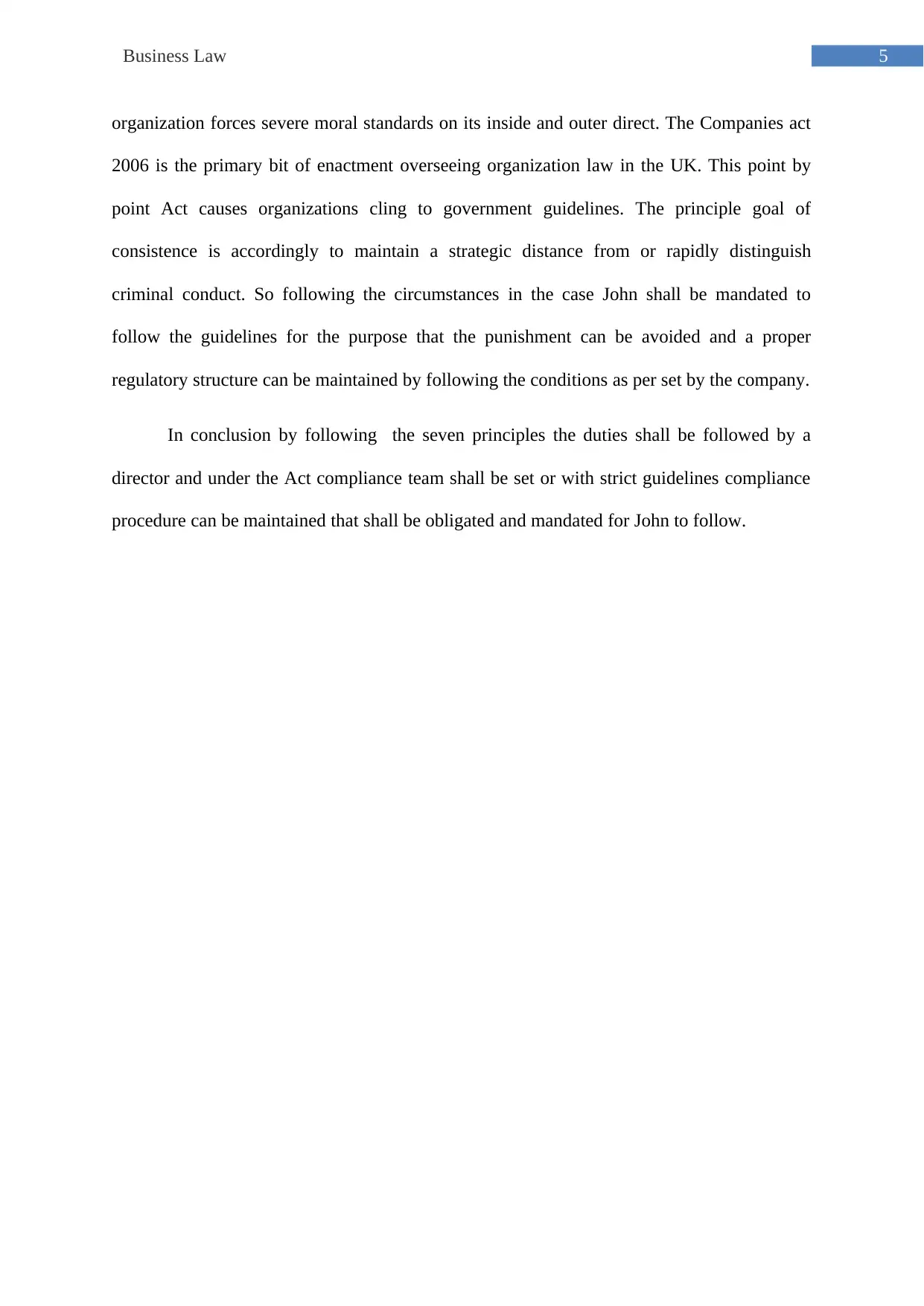
5Business Law
organization forces severe moral standards on its inside and outer direct. The Companies act
2006 is the primary bit of enactment overseeing organization law in the UK. This point by
point Act causes organizations cling to government guidelines. The principle goal of
consistence is accordingly to maintain a strategic distance from or rapidly distinguish
criminal conduct. So following the circumstances in the case John shall be mandated to
follow the guidelines for the purpose that the punishment can be avoided and a proper
regulatory structure can be maintained by following the conditions as per set by the company.
In conclusion by following the seven principles the duties shall be followed by a
director and under the Act compliance team shall be set or with strict guidelines compliance
procedure can be maintained that shall be obligated and mandated for John to follow.
organization forces severe moral standards on its inside and outer direct. The Companies act
2006 is the primary bit of enactment overseeing organization law in the UK. This point by
point Act causes organizations cling to government guidelines. The principle goal of
consistence is accordingly to maintain a strategic distance from or rapidly distinguish
criminal conduct. So following the circumstances in the case John shall be mandated to
follow the guidelines for the purpose that the punishment can be avoided and a proper
regulatory structure can be maintained by following the conditions as per set by the company.
In conclusion by following the seven principles the duties shall be followed by a
director and under the Act compliance team shall be set or with strict guidelines compliance
procedure can be maintained that shall be obligated and mandated for John to follow.
⊘ This is a preview!⊘
Do you want full access?
Subscribe today to unlock all pages.

Trusted by 1+ million students worldwide
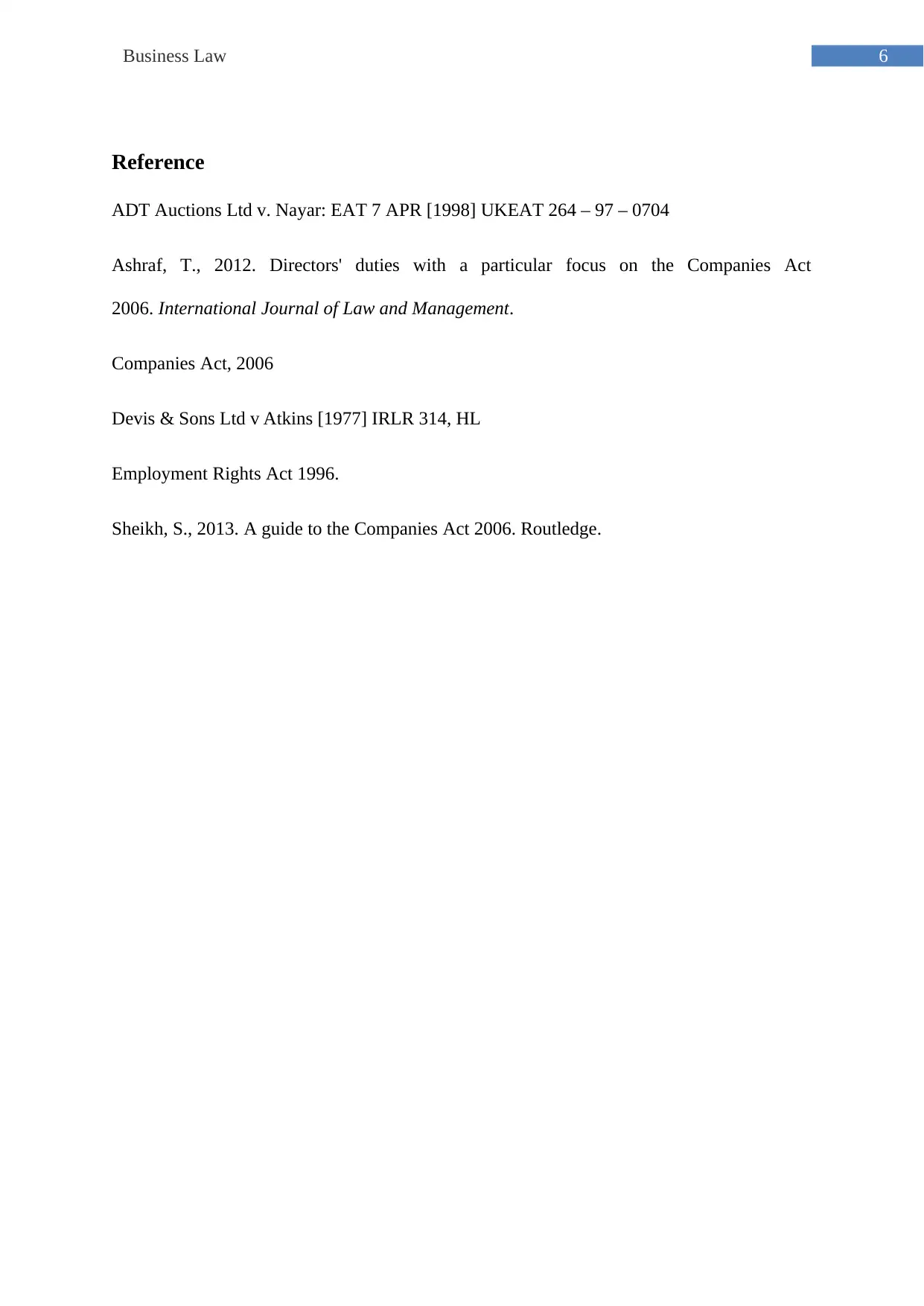
6Business Law
Reference
ADT Auctions Ltd v. Nayar: EAT 7 APR [1998] UKEAT 264 – 97 – 0704
Ashraf, T., 2012. Directors' duties with a particular focus on the Companies Act
2006. International Journal of Law and Management.
Companies Act, 2006
Devis & Sons Ltd v Atkins [1977] IRLR 314, HL
Employment Rights Act 1996.
Sheikh, S., 2013. A guide to the Companies Act 2006. Routledge.
Reference
ADT Auctions Ltd v. Nayar: EAT 7 APR [1998] UKEAT 264 – 97 – 0704
Ashraf, T., 2012. Directors' duties with a particular focus on the Companies Act
2006. International Journal of Law and Management.
Companies Act, 2006
Devis & Sons Ltd v Atkins [1977] IRLR 314, HL
Employment Rights Act 1996.
Sheikh, S., 2013. A guide to the Companies Act 2006. Routledge.
1 out of 7
Related Documents
Your All-in-One AI-Powered Toolkit for Academic Success.
+13062052269
info@desklib.com
Available 24*7 on WhatsApp / Email
![[object Object]](/_next/static/media/star-bottom.7253800d.svg)
Unlock your academic potential
Copyright © 2020–2026 A2Z Services. All Rights Reserved. Developed and managed by ZUCOL.





